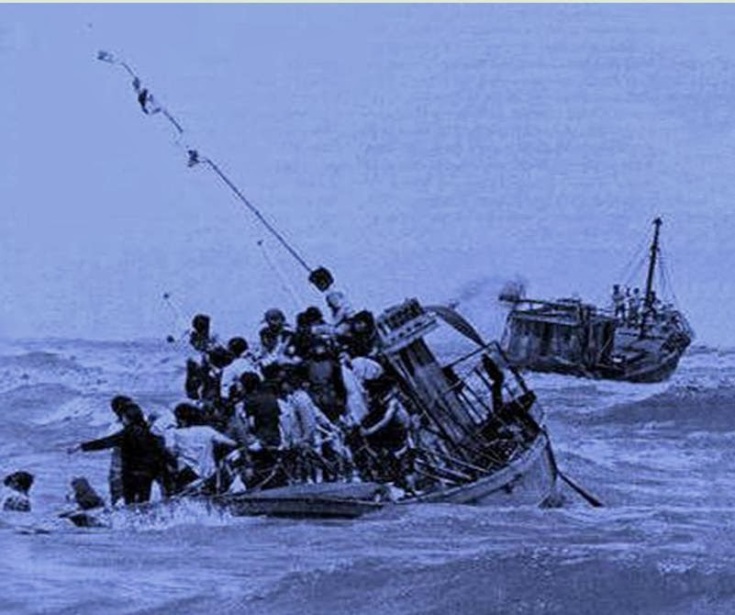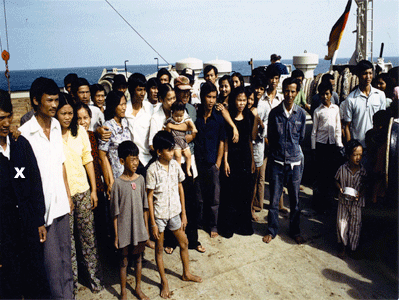
The lower half of my top-ten lists may include lesser known or even semi-obscure tunes, but the upper half of each list is consisted of only well known songs. Now that I’m entering the top half, the remaining songs should be very familiar to Vietnamese refugees and immigrants.
When compiling this list, I knew that I wanted to include at least one song about the “boat people” experience. The challenge, however, is that there are not many strong options. Given the boat people phenomenon, it is somewhat odd and I don’t have a good explanation for it. In this case, it came down to Lời Kinh Đêm by Việt Dzũng and the song in this post written by Châu Đình An. It’s a toss-up, but there is room for only one boat people song. In the end I decided on Đêm Chôn Dầu Vượt Biển, partially because the late Việt Dzũng will appear on this list later for a different song.
Born in the year of national division, Châu Đình An (1954- ) was incarcerated in reeducation camps for some time after the Fall of Saigon. After release, he tried to escape by boat as tens of thousands of other Vietnamese. It cost a lot of gold to sign up for an escape – Vietnamese money was more or less worthless at the time – but An had none. So he volunteered to obtain gasoline from the black market, particularly from communist soldiers who worked in transport, who pilfered and sold some alleviate their own economic shortcoming. (An notes that these dealings always occurred at night.) He also had to hide them near the meeting point of the planned escape. His boat left in 1980 and was picked up by a West German ship that took the boat people to Hong Kong, where An wrote this song. He came to the U.S. later that year, got involved in the music business, and produced a number of albums.

In the following YouTube video, taken from the one of the early Thúy Nga productions, the song begins at 45:00. (It is preceded by a clip on the boat people.) The singer is Phượng Mai, and I wish to make sure to include her name in this post because Châu Đình An himself forgot to acknowledge hers among notable performances during a video interview with the Người Việt daily. I am not 100% sure that this is the first recording of this song, but it must have been one of the very first.
In the same interview, Châu Đình An names Duy Quang, Khánh Ly, Hương Lan, and Như Quỳnh. All have interesting recordings, and the Khánh Ly’s is found at the end of this post. But Như Quỳnh’s is the best known among Vietnamese Americans today thanks to a performance in another – and much later – Thúy Nga video. The first three minutes of the video shows a montage related to the Fall of Saigon and its aftermath, and her voice starts at 3:07.
A couple of notes on translation… First, I opt to translate anh, which means an older male in this context, as “I” even though most recordings feature female vocals. It is all right to translate it as “he,” but I think that it takes away some of the intimacy in the lyrics of this song.
Second, the song title refers to gasoline, which is typically called xăng in Vietnamese. But it doesn’t sound elegant in a lyrical tune like this one, so An went for dầu instead, which is a more generic word to mean oil: cooking oil, engine oil, or another sort of oil. For this translation, I’m going with gas or gasoline so to avoid confusion. A literal if slightly fanciful translation of the title is Nocturnal Concealment of Gasoline for the Boat Escape, but I shall stick with the less poetic Hiding Gasoline at Night for the Boat Escape.
UPDATE 4/28/16: Appreciation to Tuong Vu for noting that dầu refers to diesel oil in this context, since most fishing boats were run by diesel. It was also less dangerous to hide and bury diesel than gasoline. Hence, the English translation in the title has been changed from “gasoline” to “diesel.”
UPDATE 4/29/16: From Alex Thai Vo, it’s been common for northern Vietnamese to use the compound term xăng dầu. Alex notes that northerners may use certain compound terms but southerners may use only one word in that term.
The first two verses mix escape and romantic love together, then some. The narrator refers to the girl he loves. But paramount secrecy does not allow him let her know about the escape. Moreover, the last line of the first verse reveals another side to his love: love for the Vietnamese country in addition to love for the young woman.
Đêm nay anh gánh dầu ra biển anh chôn,
Anh chôn, chôn hết cả những gì của yêu thương
Anh chôn, chôn mối tình chúng mình
Gửi lại em trăm nhớ ngàn thương
Hò ơi, hò ới, tạm biệt nước non.
Tonight I take gasoline to the sea and hide it,
I bury and hide all things beloved,
I hide the love of ours,
And send you all my loving instead.
Chant! Chant farewell to the country!
Without neglecting romantic love, the second verse further demonstrates his love for Vietnam.
Đêm nay đêm tối trời anh bỏ quê hương
Ra đi trên chiếc thuyền
Hy vọng vượt trùng dương.
Em đâu đâu có ngờ đêm buồn
Bỏ lại em cay đắng thật thương,
Hò ơi, hò ới, tạm biệt nước non.
Tonight I leave the country in the dark,
Leaving on this boat
Hoping to cross the seas.
You do not yet know this sad night,
As I leave you in bitter sorrow.
Chant! Chant farewell to the beloved country!
The refrain shifts from the slow waltz of the verses to more upbeat pace, demonstrating determination amidst sadness and uncertainty. Note the fading sight of the mountain in the last line of the refrain: a symbol of home and country. Like countless other refugees, I can confirm that watching that fading sight was an unusual experience of feeling sorrow and hope simultaneously.
Anh phải bỏ đi thắp lên ngọn lửa hy vọng,
Anh phải bỏ đi để em còn sống,
Anh phải rời xa mẹ Việt Nam đau đớn,
Quê mình rồi đây em có đợi chờ.
Anh tạm rời xa nước non mình yêu kiều,
Ô người thân yêu người quen hàng xóm,
Mong vượt biển Đông mà lòng anh tan nát,
Núi mờ mờ xa ôi ngọn núi ở quê hương.
I must leave to light the torch of hope,
I must leave so you can live,
I must leave Mother Vietnam in pain,
Please wait for me in the country.
For now, I’ll leave our beloved country,
Leaving relatives and friends and neighbors,
My heart is anguished while hoping to cross the Pacific,
Fading away is the sight of mountain and homeland.
Characteristic of refugee music, the tone returns to sadness in the last two verses. Boat people rallied themselves for the success of escape, but there could be no escape from the grief of loss.
Đêm nay anh gánh dầu ra biển anh đi,
Ra đi trên sóng cuộn, thấy gì ở quê hương,
Xa xa ôi núi mờ xa dần,
Một giọt nước mắt khóc phận thân,
Hò ơi hò ới phận kẻ lưu vong,
Hó ơi hò ới phận kẻ lưu vong.
Tonight I take gasoline to the sea for the escape,
I travel over the waves and watch back at my homeland,
The distance grows and the mountain fade,
A teardrop crying for this divided body,
Chant! Chant for the people in exile,
Chant! Chant for the people in exile.
Not insignificant is the fact that Châu Đình An and many other refugees considered themselves to be in exile. Their emotional tie to the Vietnamese nation was too strong to sever, and the hope to land safely was not divorced from the more distant hope of returning to Vietnam one day. This feeling is further articulated in the last verse.
Đêm nay trên bản đồ có một thuyền ra đi
Hiên ngang trên sóng gào tự do đón chào
Xin chào tự do với nỗi niềm cay đắng
Nhìn lại bên bờ nước non mình muối mặn
Khóc nghẹn ngào.
Hò ơi! Hò ới! tạm biệt nước non…
Hò ơi! Hò ới! tạm biệt nước non…
Tonight there is a departing boat on the map,
It moves proudly over screaming waves towards [the] welcoming [arms of] liberty,
We greet freedom with pain and bitterness in the heart.
For we are choked with tears
While looking back at our country and our sea.
Chant, chant farewell to our homeland…
Chant, chant farewell to our homeland…
In my opinion, the melody of Đêm Chôn Dầu Vượt Biển is merely passable, but it is carried and empowered by the moving lyrics that operate on two levels. First, the verses and refrain shift between the personal and the national when it comes to the identity of the refugees. Second, they weave a mosaic of pain, sorrow, and fear on the one hand – and hope and determination on the other hand.
There was, of course, a lot more about the phenomenon and experience of the boat people, including piracy, robbery, rape, death, and kidnapping. One song cannot encapsulate the multiplicities of this experience, including the multiplicities of grief and pain. Focusing on the preparation and the first day of escape, however, Châu Đình An’s song reveals some depth to one aspect of this experience. It is not a negligible achievement, and it further justifies my choice to have this song over Việt Dzũng’s fine tune that focuses on the latter part of the experience of escape.
Leave a comment